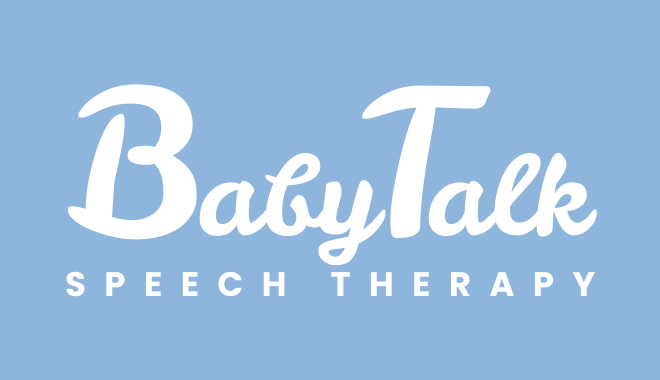Does my child need speech therapy?
You know your child best—you know their strengths, their weaknesses, and you may have some concerns about their speech and language development. Check out our developmental checklist below to determine if your child’s speech and language skills should trigger a referral (either through your pediatrician or from yourself) for an evaluation.
If by 6-9 months your child does not:
Exhibit cooing and babbling;
Seem to be aware of sound (doesn’t turn to sound, stop crying when spoken to);
Use eye gaze to indicate interest;
Smile;
Demonstrate understanding of daily routines;
Babble with speech-like sounds;
Imitate actions and/or sounds in a turn-taking exchange with parents;
Make eye contact consistently.
We recommend:
Test your child’s hearing. Talk about your child’s daily routines frequently, and in simple language (2–3 words at a time). Use speech/routine games suck as “Peek-a-boo”, “Patty-cake”, “Itsy bitsy spider”.
If by 12 months your child does not:
Turn when parents say the child’s name;
Babble back and forth with the parent/caregiver;
Recognize his/her name;
Understand simple instructions;
Initiate familiar words, gestures, and sounds;
Understand common objects and actions (e.g., cookie, eat, juice).
We recommend:
Label items frequently, using 1–2 words. Take turns with your child and WAIT for your child to respond, and then imitate him/her.
If by 15-18 months your child does not:
Show language behaviors listed in previous ages
Turn to look when the parent points saying, "Look at…";
Point themselves to show parents an interesting object or event;
Have 5–10 words including names;
Say more words every month;
Follow simple directions;
Show recognition of pictures of familiar persons, objects;
Doesn’t point, gesture or imitate simple actions.
We recommend:
Speech/language evaluation and therapy. Also, a developmental evaluation if any previous behaviors listed are not resolved. Find out what he/she is interested in. Follow their lead and let them guide the play. Talk about what your child is doing in very few words.
If by 24 months (2 years), your child does not:
Understand simple questions and commands;
Respond to such commands as "show me your eyes (nose, mouth, hair)";
Label pictures;
Have a vocabulary of at least 25 words (norm is 50–100, with word combinations)
We recommend:
Speech/language evaluation and therapy. Developmental evaluation if any previous behaviors listed are not resolved.
If by 30 months (2 1/2 years), your child does not:
Speak in 2–3 word combinations;
Does not have a vocabulary of at least 75 words;
Does not follow two-step directions (given without a point).
We recommend:
Speech/language evaluation and therapy. Developmental evaluation if any previous behaviors listed are not resolved.
If by age 3 years, your child cannot:
Retell a basic story or idea;
Be understood by family and/or caregivers;
Repeat when not understood without becoming frustrated;
Understand most simple questions dealing with his environment and activities;
Give his/her gender, name, age.
We recommend:
Speech/language evaluation and therapy. Developmental evaluation if any previous behaviors listed are not resolved.
If by age 4 years, your child cannot:
Be understood by individuals with whom he/she does not associate regularly;
Communicate as well as their peers (as seen in daycare, preschool, playgroups);
Use extensive verbalization as he carries out activities;
Maintain appropriate tense, grammar, use appropriate word endings independently;
Talk easily and fluently– without repeating syllables or words
Play well with others her age and younger.
We recommend:
Speech/language evaluation and therapy.
If by age 5 years, your child cannot:
Be understood in all situations by most listeners;
Correctly produce most speech sounds;
Follow a three-step command;
Pay attention to a short story and answer simple questions about it;
Tell stories that stick to the topic;
Does not desire to play with children his same age or engage in role-play with friends;
We recommend:
Speech/language evaluation and therapy.
After age 5, if your child struggles with receptive language (understanding), expressive language (expressing him/herself with adequate phrase length, grammar, taking turns in conversation), or articulation (speech sounds), he/she should be referred for a speech/language evaluation.

